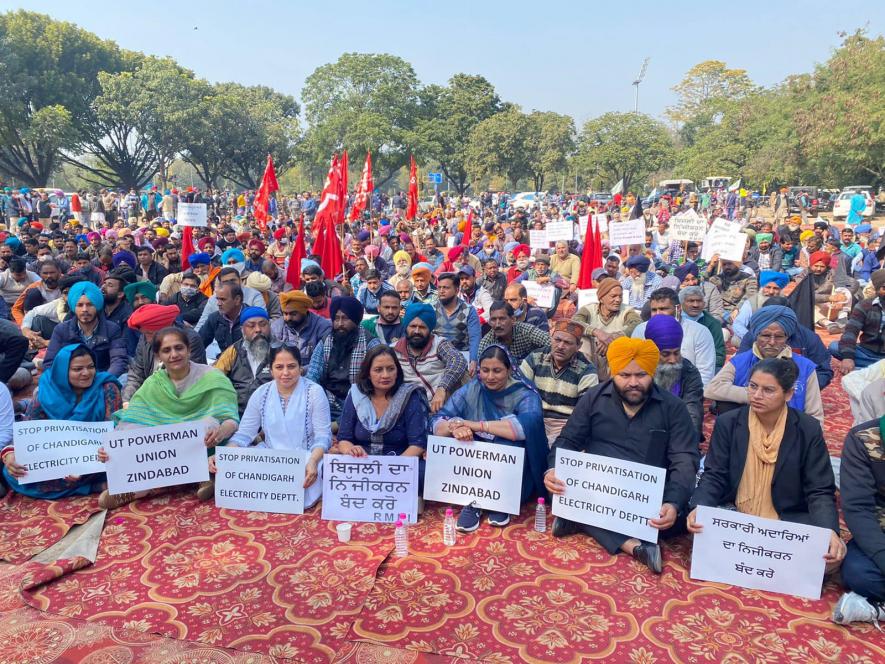Chandigarh: As Privatisation Looms Over UT’s Discom, Employees Prepare for Strike

The electricity employees in Chandigarh have been protesting against the privatisation decision for many months now. Image Courtesy - Facebook
New Delhi: Days after the strike actions of power men succeeded in pushing the administrations to put on hold the proposed privatisation of power distribution and transmission in at least two Union Territories in the country. Chandigarh is set to emerge as another region where similar plans may get hamstrung in the days to come.
The UT Powermen Union – Chandigarh unit has given a call for a three-day work strike, which is set to begin from February 22, in a bid to register their protest against the granting of approval for privatisation of Chandigarh Discom (Distribution Company) by the Union Cabinet.
The union, which represents close to a thousand electricity employees and engineers in the centrally administered territory, has also threatened to extend their strike action for an indefinite period in case the decision to privatise the UT’s electricity department, a “profit-making entity”, is not withdrawn.
Preparations are underway to ensure that the upcoming strike action successfully pushes the Chandigarh administration to budge along similar lines as what was witnessed last year in Jammu Kashmir and more recently in Puducherry claimed union leaders on Friday while speaking to NewsClick.
The agitating employees, who fear that the privatisation of Chandigarh Discom would portend a change in their service conditions along with higher power tariffs for the UT's residents, have also managed to secure support from not just electricity employees from other states, but Central Trade Unions as well.
On January 7, the Union Cabinet approved the highest bid submitted by one Kolkata-based Eminent Electricity Distribution Limited (EEDL) for converting the Chandigarh DISCOM into a private firm.
A subsidiary of Calcutta Electric Supply Corporation (CESC), a flagship company of RP-Sanjiv Goenka Group, EEDL made the highest bid of around Rs 871 crore against the reserve price of Rs 175 crore.
The development had come months after the Supreme Court last year stayed an order by the Punjab and Haryana High Court, thereby ensuring that the Chandigarh administration could resume the sale tender for the privatisation process to a report in The Tribune. The petition in the High Court was filed by the same Chandigarh’s UT Powermen Union.
The electricity employees have been up in arms against the Narendra Modi – led Central government ever since it announced its plans to privatise the discoms in seven UTs, Gopal Dutt Joshi, general secretary, powermen union told NewsClick in a telephone interview on Friday.
In May 2020, under its much-touted Atma Nirbhar Bharat Abhiyan, the Central government announced to reform the power distribution and retail supply in UTs through privatisation of the power distribution units in a plan, as articulated by Finance Minister Nirmala Sitharaman, to leverage power sector efficiency in electricity distribution.
The seven UTs are Chandigarh, Puducherry, Andaman and Nicobar Islands, Dadar and Nagar Haveli, Daman and Diu, Jammu & Kashmir, and Ladakh.
The structural reform, however, met with legal battles and protests by powermen unions in multiple UTs, soon after attempts by local administration were initiated to privatise their respective electricity departments.
“Privatisation of a discom would mean that the service conditions of the electricity employees would get diluted under the management of a private firm. [The latter] would also raise power tariffs as their major objective would be to make profits,” argued Dutt on Friday, when he was asked to explain the fears of powermen.
Indeed, similar arguments have been on the lips of electricity employees in other UTs, which subsequently resulted in the privatisation plan making little progress till now.
In December last year, the Jammu & Kashmir administration had to put on hold the proposal to privatise the Jammu and Kashmir Power Development Department (JKPDD) after 20,000 employees of the latter abstained from their duties in protest – their strike action caused power outages in the whole of the UT.
Likewise, Puducherry administration too assured to explore the pros and cons of privatisation of the power sector and re-negotiate the proposal with the Centre after the employees of Puducherry Electricity department went on an indefinite strike earlier in February this year.
On Friday, Dutt of Chandigarh's powermen union claimed that the electricity employees in Chandigarh would also "be forced" to go on an indefinite strike if the UT administration does not address their demands.
At present, the Chandigarh DISCOM reportedly caters to nearly 2.14 lakh domestic consumers, which accounts for more than 87 per cent of the total consumers; the remaining are commercial, small power, medium supply, large supply consumers, among others.
Prasanta N Chowdhary, convenor, National Coordination Committee of Electricity Employees & Engineers (NCCOEEE) told NewsClick on Friday that the powermen of all the states are standing shoulder to shoulder with those in Chandigarh. "If they [powermen in Chandigarh] face any repressive action during their strike action, then employees in other states will mobilise in large numbers in solidarity within few days," he said.
Asked about the proposal to privatise the Chandigarh DISCOM, Chowdhary said: “It is a reckless policy decision to privatise a profit-making entity.”
Meanwhile, on Thursday, the Centre of Indian Trade Unions (CITU) also came to support the electricity employees in Chandigarh, condemning the “unbridled servility of the Modi regime to the corporate caprices for the public assets.”
In its statement, the Central Trade Union added that the Central government drew no lessons from the united joint movement of electricity employees and engineers with public support in the UTs of Jammu & Kashmir and Puducherry.
Get the latest reports & analysis with people's perspective on Protests, movements & deep analytical videos, discussions of the current affairs in your Telegram app. Subscribe to NewsClick's Telegram channel & get Real-Time updates on stories, as they get published on our website.
























